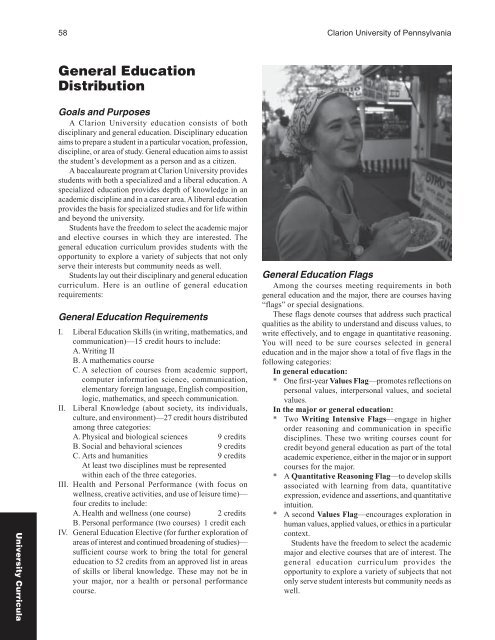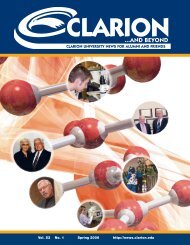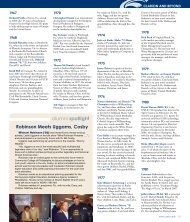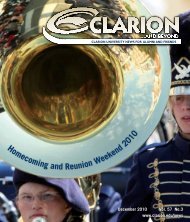Undergraduate - Clarion University
Undergraduate - Clarion University
Undergraduate - Clarion University
Create successful ePaper yourself
Turn your PDF publications into a flip-book with our unique Google optimized e-Paper software.
58 <strong>Clarion</strong> <strong>University</strong> of Pennsylvania<br />
General Education<br />
Distribution<br />
<strong>University</strong> Curricula<br />
Goals and Purposes<br />
A <strong>Clarion</strong> <strong>University</strong> education consists of both<br />
disciplinary and general education. Disciplinary education<br />
aims to prepare a student in a particular vocation, profession,<br />
discipline, or area of study. General education aims to assist<br />
the student’s development as a person and as a citizen.<br />
A baccalaureate program at <strong>Clarion</strong> <strong>University</strong> provides<br />
students with both a specialized and a liberal education. A<br />
specialized education provides depth of knowledge in an<br />
academic discipline and in a career area. A liberal education<br />
provides the basis for specialized studies and for life within<br />
and beyond the university.<br />
Students have the freedom to select the academic major<br />
and elective courses in which they are interested. The<br />
general education curriculum provides students with the<br />
opportunity to explore a variety of subjects that not only<br />
serve their interests but community needs as well.<br />
Students lay out their disciplinary and general education<br />
curriculum. Here is an outline of general education<br />
requirements:<br />
General Education Requirements<br />
I. Liberal Education Skills (in writing, mathematics, and<br />
communication)—15 credit hours to include:<br />
A. Writing II<br />
B. A mathematics course<br />
C. A selection of courses from academic support,<br />
computer information science, communication,<br />
elementary foreign language, English composition,<br />
logic, mathematics, and speech communication.<br />
II.<br />
Liberal Knowledge (about society, its individuals,<br />
culture, and environment)—27 credit hours distributed<br />
among three categories:<br />
A. Physical and biological sciences 9 credits<br />
B. Social and behavioral sciences 9 credits<br />
C. Arts and humanities 9 credits<br />
At least two disciplines must be represented<br />
within each of the three categories.<br />
III. Health and Personal Performance (with focus on<br />
wellness, creative activities, and use of leisure time)—<br />
four credits to include:<br />
A. Health and wellness (one course) 2 credits<br />
B. Personal performance (two courses) 1 credit each<br />
IV. General Education Elective (for further exploration of<br />
areas of interest and continued broadening of studies)—<br />
sufficient course work to bring the total for general<br />
education to 52 credits from an approved list in areas<br />
of skills or liberal knowledge. These may not be in<br />
your major, nor a health or personal performance<br />
course.<br />
General Education Flags<br />
Among the courses meeting requirements in both<br />
general education and the major, there are courses having<br />
“flags” or special designations.<br />
These flags denote courses that address such practical<br />
qualities as the ability to understand and discuss values, to<br />
write effectively, and to engage in quantitative reasoning.<br />
You will need to be sure courses selected in general<br />
education and in the major show a total of five flags in the<br />
following categories:<br />
In general education:<br />
* One first-year Values Flag—promotes reflections on<br />
personal values, interpersonal values, and societal<br />
values.<br />
In the major or general education:<br />
* Two Writing Intensive Flags—engage in higher<br />
order reasoning and communication in specific<br />
disciplines. These two writing courses count for<br />
credit beyond general education as part of the total<br />
academic experience, either in the major or in support<br />
courses for the major.<br />
* A Quantitative Reasoning Flag—to develop skills<br />
associated with learning from data, quantitative<br />
expression, evidence and assertions, and quantitative<br />
intuition.<br />
* A second Values Flag—encourages exploration in<br />
human values, applied values, or ethics in a particular<br />
context.<br />
Students have the freedom to select the academic<br />
major and elective courses that are of interest. The<br />
general education curriculum provides the<br />
opportunity to explore a variety of subjects that not<br />
only serve student interests but community needs as<br />
well.
















